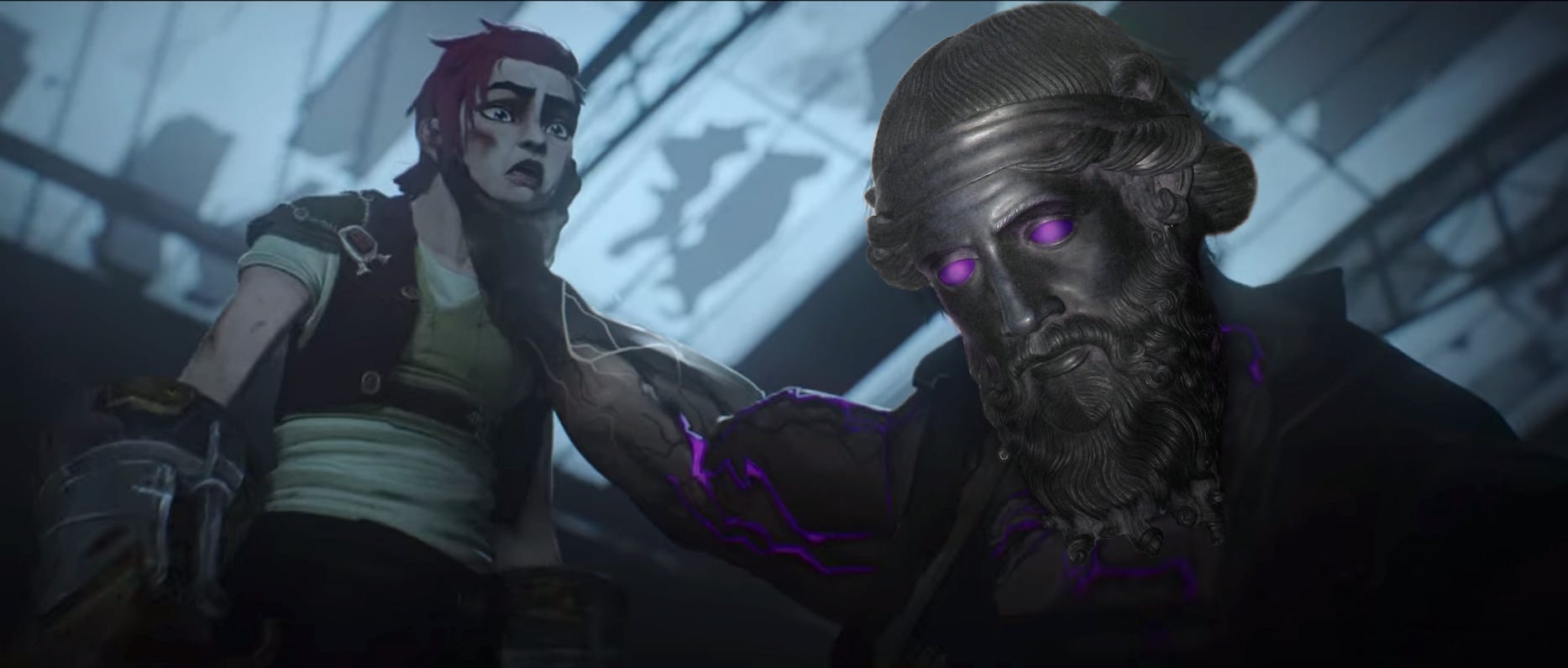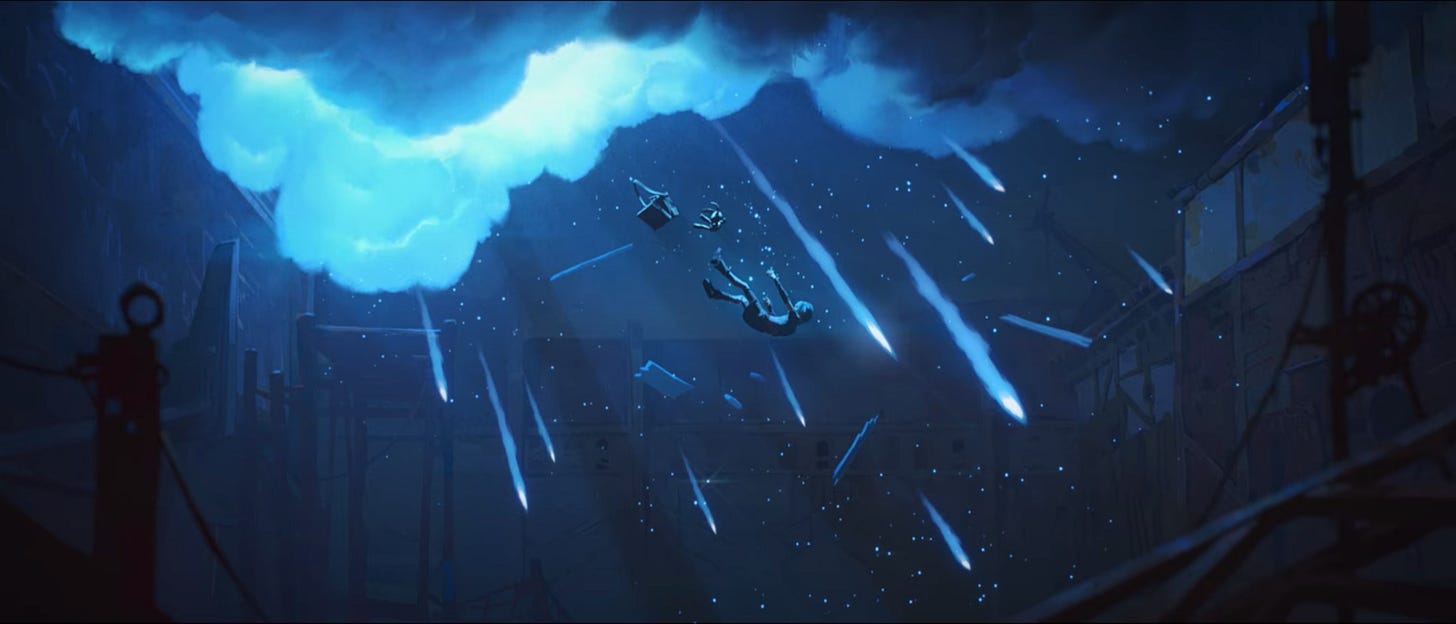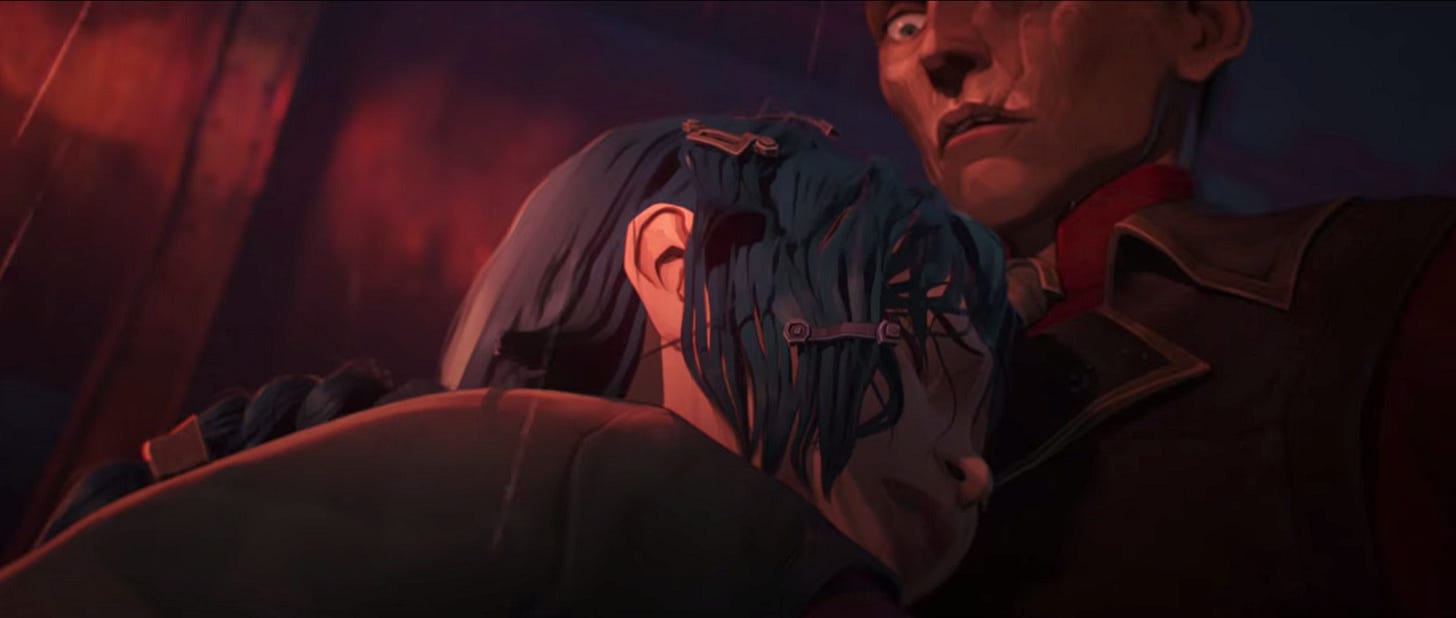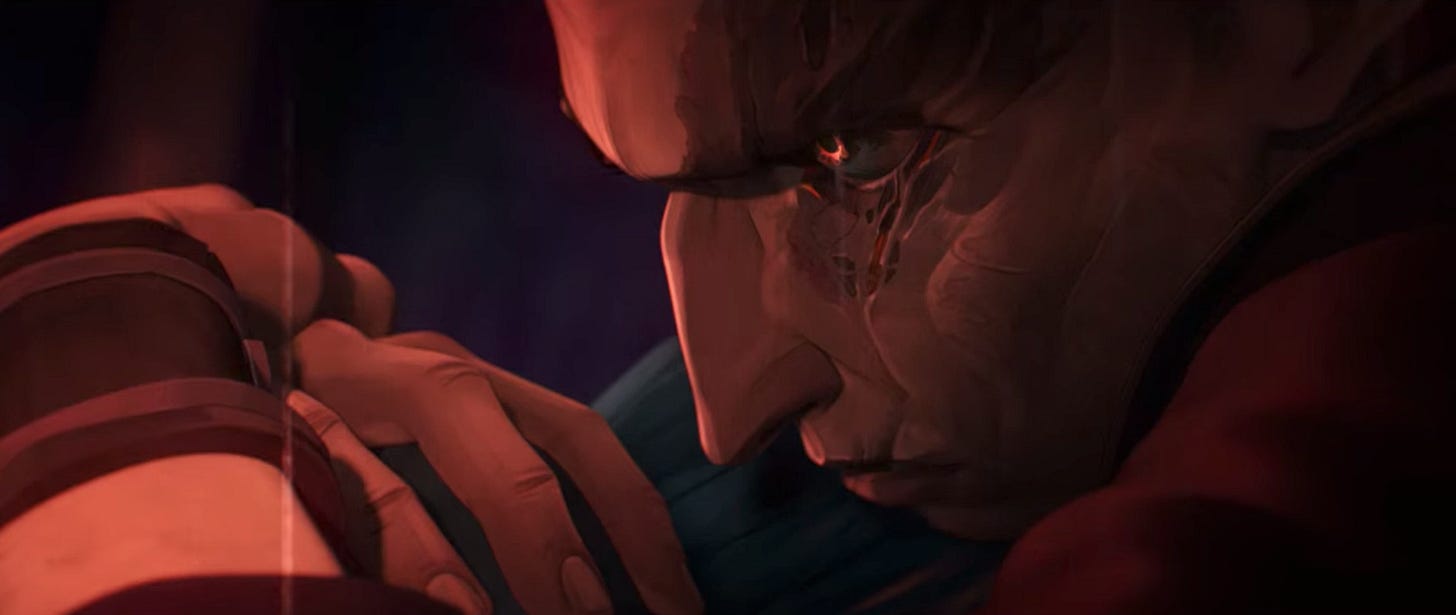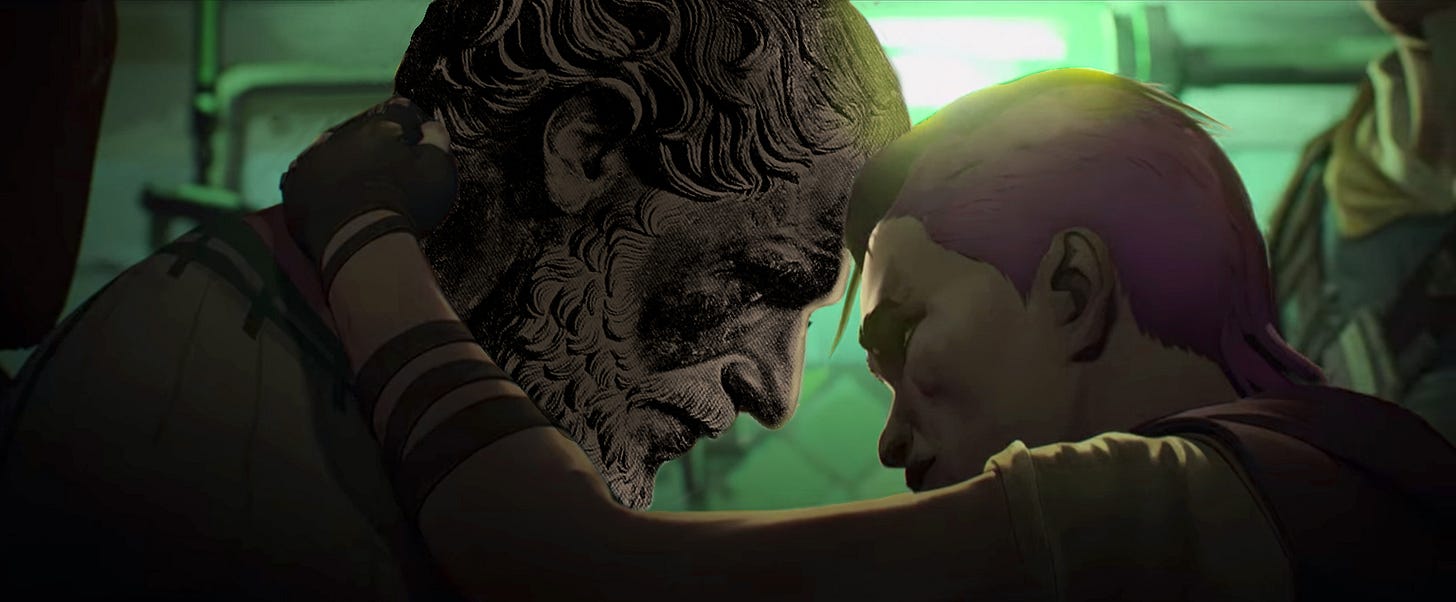Arcane vs Aristotle Part VIII
Tragic Relationships and Putting Aristotle to the Test!
SPOILER WARNING: This section will be filled with spoilers from the first three episodes of Arcane.
AUTHOR NOTE: The thoughts below are based purely on my own observations of the television show “Arcane: League of Legends” and the direct text of Aristotle’s “Poetics” based on the S.H. Butcher translation originally published in 1895. For this deep dive, I was too lazy to place footnotes on every quote, but any time you see quotations, know that the source is Aristotle’s words as translated by Butcher.
Introduction
If you have not read Parts I-VII of this deep dive, I recommend going through them first. In this section I will be making reference to Aristotelian terms introduced in those sections by placing them in quotes. (Example: ‘thought’) These words sometimes have a special meaning that carries more complexity than the standard dictionary definition, so I explain their meanings to the best of my ability in those earlier sections.
Make My Tragic Characters Near and Dear, Please…
“If an enemy kills an enemy, there is nothing to excite pity either in the act or the intention—except so far as the suffering is pitiful. So again with indifferent persons. But when the tragic incident occurs between those who are near and dear to one another—if , for example, a brother kills, or intends to kill, a brother, a son his father, a mother her son, a son his mother, or any deed of the kind is done—these are the situations to be looked for by the poet.”
-Poetics, XIV
Now that we talked about ‘inner structure’ in Part VII, let’s go back to the end of Episode 3 to show how two central relationships use Aristotle’s concepts to lead us into the powerful Act I catharsis.
The Brothers: Silco and Vander
The initial driving action for Episode 3 is Silco kidnapping Vander leading to the rescue effort by Vi and the gang.1 Silco’s motivations for kidnapping Vander are not fully explained until later, but the episode’s violent opening flashback suggests there is a deeper history with Silco to be explored.
Once Vander is captive, the two have a conversation in which we learn the two of them fought side by side during the first uprising against the upper city. The only new information delivered to us through this dialogue is the exact relationship of Silco and Vander. Vander says he considered Silco his “brother” (it is unclear if this is familial), and Silco in turn says he was “betrayed” by Vander.
While both of them also explain their ethical philosophies (‘character’) to each other, the ‘thought’ behind their dialogue is only reinforcing what has already been shown through ‘action’ in previous scenes. For example:
Vander shows in the opening of Episode 1 that he was a fighter who gives up his weapons to care for orphans. (pacifism)
Silco shows he is willing to manipulate Deckard to test his dangerous drug on a human. (violence)
Vander shows he is willing to negotiate backroom deals to keep the peace between the two cities. (pacifism)
Silco betrays the deal he made with police by killing chief Grayson to flex his monster’s new powers. (violence)
Unlike a couple of characters dumping exposition through their dialogue in a less skillful script, these characters’ words are given more authenticity and weight because we have already seen their ‘character’ backed up with ‘actions’ in previous scenes.
***Aristotle Good Tragedy Point awarded!***
But wait! There’s more!
The brothers’ dialogue reveals that the two of them fought together rather than being basic sworn enemies. By doing so, the writers:
Create a ‘recognition’ moment that changes the perceived relationship
Turn this relationship from a weak tragic choice— enemies—to a strong tragic choice: “brothers”
***TWO Aristotle Good Tragedy Points awarded!***
Finally, it is important to talk about Silco’s character here because he will play a vital role in Powder and Vi’s climax. Throughout Silco’s scenes, we have been given a glimpse into his sophisticated personality. He is cunning, manipulative, and ruthless.
What makes this conversation especially important is that we get to see Silco through Vander’s eyes. Vander admits he felt guilt hurting Silco which means Vander cared for him, and, for a moment, we as an audience get to sympathize with Silco. We can see him not as a monster but instead as a misguided little brother.
Before this moment, Silco’s goals could have been as cliche as “making the upper city burn” or “gaining riches.” Instead, we learn Silco is a man with ‘ethical’ motivations despite how twisted his tactics have become.
In addition, Silco’s emotional pain from Vander’s betrayal drives his ‘pathetic’ motivation: he wants to justify his own moral choices by proving Vander is still like him, only weaker for not fighting. After Vander finally fights back, and as Silco drives his knife into Vander’s side one last time, he whispers in Vander’s ear, “I knew you still had it in you.”
Silco wins, we hate him again, and just like that we get two of the Four Types of Tragedy at once: Ethical and Pathetic!
***TWO MORE Aristotle Good Tragedy Points awarded!***
The Sisters: Powder and Vi
While Vander and Silco’s relationship is finally being revealed in this episode, Powder and Vi’s relationship is pretty clear based on the previous episodes.
Powder’s arc has established she is insecure about her ability to help the team and wants to prove herself to her older sister. Through one action choice after another, Powder’s arc is reinforced by the consequences of those choices. Every attempt to better herself in her sister’s eyes has failed and only made things worse for the group.
So when we get to Vi’s decision to make Powder stay behind during the rescue, Powder has reached a breaking point of frustration that results in an emotional outburst—her ‘scene of suffering.’ (POINT!)
As we discussed in Part IV, the most effective cause for tragedy is by a character’s error or frailty rather than vice or depravity. Powder’s emotional unbalancing in this scene makes her judgement vulnerable to ‘error’(POINT!), but Powder’s tragic mistake in the climax is further rationalized by her need to fix her ‘frailty’ (i.e. her failed grenades.) (Another POINT!)
That’s THREE Aristotle Good Tragedy points all stemming from a strong plot to motivate Powder’s actions. In addition, like Silco and Vander, sisters who love each other is one of the most tragic relationships to destroy. (One more POINT!)

Vi’s character arc has been less about her relationship with Powder and more about her relationship with Vander. Vander recognizes Vi is a role model for the kids and is trying to teach her why using violence to solve your problems just leads to more problems. Vander explains this through a series of ‘thought’ moments when he talks to Vi alone. Not as strong as a good ‘action’ teaching moment, but still valid plot and character information. (Eh, half a point.)
However, Vi may have needed one of those action lessons because her repeated flaw is not listening to Vander’s advice. (Teenagers, amiright?) Vander tells Vi to get rid of everything they stole in the looting, but when she discovers Powder still has the stones, she tells her to keep it secret from Vander—probably because she needs a win after their heavy losses. Sadly, this decision places responsibility for the tragic explosion Powder later creates partially on Vi’s error in judgement. (POINT!)
Later in a moment of growth, however, we see Vi take Vander’s advice to heart with ‘action’ when she makes an ‘ethical’ decision to turn herself in to protect Powder and the others. Unfortunately, Vander squashes Vi’s sacrifice with a ‘pathetic’ action to save his daughter by taking her place. So, in this case, Vander’s attempt to protect Vi pushes her back toward the violence she was trying to avoid when she later attempts to rescue him.
As we can see, Vi and Vander have consistently shown they have good moral character through their actions: both have shown examples of sticking up for the little guy and both make morally questionable decisions to protect people they love. However, despite their best attempts to do the right thing, tragedy still occurs that partially rests on the shoulders of their actions. (Let’s just call all that: 5 Aristotle Points for House Arcane!)
This is why Aristotle explains that the plot is “soul of Tragedy.” Because it is not the characters’ morality that causes bad things to happen. It is instead a plot made up of ‘probable and necessary’ decisions that betrays the good characters in the end.
A “Simple” Explosion
“For the power of Tragedy is felt even apart from representation and actors.”
-Poetics, VI
Already we have seen at least three types of tragedy in Episode 3 leading up to the climax: Pathetic, Ethical, and Complex. All of these types have appeared immediately or in the ‘unravelling’ of two major incidents: Silco kidnapping Vander for political motives and Vi’s reveal that she can’t trust Powder at the rescue.
The final type, Simple, does appear in the episode, but to describe it as “simple” would be an understatement. The “explosive” incident occurs when so many plot lines are literally and figuratively ripped apart by Powder’s Arcane bomb.
To explain why I am considering the massive explosion ‘Simple’, take a moment review the definition of a ‘simple’ tragedy:
“…the change of fortune takes place without Reversal of Situation and without Recognition.”
-Poetics, X
At the moment Powder sends in her grenade, our main characters are trapped in a room trying to break Vander free before Deckard busts through the door to kill them all. Powder sends in the explosive to kill the monster, but she does not anticipate the power of the explosion which causes irreversible collateral damage: Milo and Clagger are killed while Vi and Vander are trapped under rubble.
There is no ‘reversal of situation’ technically because the fortune of Vi and company goes from bad to worse, but the bad situation does not necessarily reverse to better for Silco’s crew, either. The explosion merely complicates the existing circumstances the characters now have to deal with.
While there is a ‘recognition’ moment that occurs later with Vi discovering Powder is responsible, that moment is actually more the ‘unravelling’ afterwards than it is an immediate consequence of the explosion.
Finally, the explosion itself is the very definition of ‘spectacle.’ It is a magical force, Arcane, being used against another magical force, Shimmer. Both of these elements are introduced as a form of ‘Deus Ex Machina’ in the beginning of the show because their origins are unclear. Their role in this scene is acceptable, however, because the effects of their powers have already been introduced through ‘action’ in the previous episodes.
So, once again, the writers managed to curb stomp our expectations with disaster. Instead of saving the day, Powder kills her friends. Instead of earning her sister’s respect, Vi only verifies that Powder is a jinx who ruins everything and leaves her alone to fend for herself. But it gets worse…
Powder’s Embrace of Silco
Remember how I said it would be important seeing Silco through Vander’s eyes? This is the moment where that glimpse of a soul in Silco pays off big time for the writers.
After Powder is left by Vi, Silco comes upon the weeping girl holding a knife, and we expect the worst. However, after asking for information about the girl’s sister, Silco gets an unexpectedly relatable answer: the girl’s sister betrayed her and she is now filled with sibling rage—just like Silco!
Completely alone with no one to turn to, Powder suddenly throws herself into Silco’s arms—the last person we spectators want to see this vulnerable child end up with. However, something very sinister and complex happens in this moment thanks to what we learned about Silco through Vander.
Rather than murdering Vander’s child in one final act of revenge, Silco instead embraces her in a way that is far more frightening. His final act of revenge won’t be to kill Vander’s child but instead to make her his own. We can’t be certain of the man’s real motives for embracing this child because we have seen dual sides of his personality: he is both a cold-hearted killer and a pitiful little brother at the same time. This makes the mystery of Powder’s fate all the more terrifying!
Had we not seen the more vulnerable side of Silco through the ‘thought’ moment with Vander earlier, this moment where Silco embraces Powder would have felt unnatural, forced, and out of character. Instead, we can believe a soul exists somewhere in Silco—a soul Vander felt guilty for hurting. As we watch Silco wrap his arms and legs around Powder like a hungry spider, we can still believe his embrace is filled with a care that is in some part genuine.
That care forebodes dangers for Powder’s emotional vulnerability but simultaneously opens a crack of vulnerability in Silco that before did not exist. Like Vander at the beginning of Episode 1, Silco’s violent ideology is going be tested by becoming an adoptive father.
Only unlike Vander, Silco makes clear he is not putting down his weapons to seek a new life of non-violence with this girl. Instead, he pulls Powder close and makes a promise of vengeance that speaks directly to her childish rage: “We will show them. We will show them all.”
The Act I Catharsis Round-up!
So let’s sum all this up! Following the explosion event, we get a series of shocking ‘complications’ which represent the ‘denouement’ of Episode 3:
Milo, Clagger, and Vander die leaving Powder and Vi on their own
Vi discovers in a ‘recognition’ moment that Powder defied her orders and set off the explosion (POINT!)
That ‘recognition’ leads Vi to a ‘reversal of situation’ changing her feelings for Powder from love to anger. (POINT!)This causes her to strike Powder and call her a “jinx.”
Note that this is an action of passion but Vi’s rage is still motivated by the ‘complex’ events of the plot.
Also note: The writers made this Aristotle’s second most favorable type of tragic incident: done in ignorance, discovery afterward. (POINT!)
That moment leads Vi to a second ‘recognition’ when she realizes she used violence against the one person she cares about most. (POINT!)
Unsure how to process her own behavior, Vi leaves Powder, but Vi has another ‘reversal of situation’ when she is captured by Marcus. This is a change of fortune for the better for Marcus as he gets the criminal he’s been hunting. Unable to return to Powder, Vi’s fortune is worse. (POINT!)
Powder turns to Silco for protection (‘error’) in an action that is ‘probable and necessary’ based on her established ‘character’ and her desperate circumstances. (DOUBLE POINT!)
Each of these tragic incidents are markers on a downward spiral of ‘unravelling’ that starts from the characters’ height of nearly rescuing Vander and sinks to the depth of Powder’s choice to embrace Silco—all in a matter of minutes. As this unravelling occurs, all the emotional tension built around Powder and Vi begins to snap and release under the weight of a few heavy cathartic moments:
Vander’s death (PITY!)
Powder and Vi’s recognition moment that Powder caused the death of their friends (PITY!)
Powder turning to the worst possible father figure available (FEAR!)
***ONE MORE ARISTOTLE THREE POINTER AT THE BUZZER AND THAT’S THE GAME, FOLKS! ARCANE WINS!!!***
Conclusion
“Unity of the plot does not, as some persons think, consist in the unity of the hero. For infinitely various are the incidents in one man’s life which cannot be reduced to unity; and so, too, there are many actions of one man out of which we cannot make one action.”
-Poetics, VIII
So, with all this information, can we definitively answer our original premise of Poetics?
How does a “superior poet” arouse strong feelings of pity and fear in the audience?
Well, based on the intricate and scientifically accurate point system I devised, we can certainly conclude that the writers of Arcane won a shit-ton of Aristotle Good Tragedy Points! I dare say in competition they would give Sophocles or Bill Shakespeare a run for their money when it comes to tragic structure. (But that would be like Michael vs. Lebron or Curry vs. the Bird. The game was different back then.)
I think if there is one overall theme demonstrated here that sets Tragedy or any story up for success in Aristotle’s philosophy, it is—more often than not—every important character choice is validated or influenced by some previous ‘action.’ Whether it was an action that displayed a character’s ‘quality’ or an action that created consequences, the action is directly connected to why a character makes a choice—for better or for worse. That choice then results in action which is the cause for the next action and then another and another, etc.
This why Aristotle describes Tragedy as a “complete action.” Rather than being a series of separate events, every moment of great tragic writing is dependent on every other moment taking place before it.
“As therefore, in the other imitative arts, the imitation is one when the object imitated is one, so the plot, being an imitation of action and that a whole, the structural union of the parts being such that, if any one of them is displaced or removed, the whole will be disjointed and disturbed. ”
-Poetics, VIII
Supporting character choices with ‘thought’ moments is fine but works best when describing previous actions (e.g. Oedipus learning that he unknowingly killed his father on the road) rather than describing ethical or passionate rational (e.g. “I did this because I love her so much.”) As we have observed in the examples of this episode, ‘action’ moments we can see ourselves always make for the strongest emotional motivation for the characters, and thus, action moments lead to a stronger catharsis moment.
As I’ve pointed out, there are also several scales and other nuances Aristotle uses that I have referenced in the previous sections of this deep dive:
The Elements of Tragedy (Part I & II)
The Law of Probability and Necessity (Part III)
The Four Types of Tragic Incidents (Part IV)
The Two Parts of Tragedy (Part V)
The Four Types of Tragedy (or motivations) (Part VI)
All have been used so skillfully by the writers in just the first three episodes, it would probably take a whole book to discuss all the elements used in the entire series. A quick search on Youtube should give you a good idea of how in depth you can go into writing theory in this series.
As such, it should be pointed out that Poetics does not cover everything there is to know about good writing, and it has its own imperfections. There are some points where you can see the outdated social norms of Aristotle’s time influencing his thought and other moments where his logic seems more questionable than simply confusing to a plebian like myself.
However, the concepts Aristotle does cover in Poetics have been taught and studied for well over 2000 years now. And seeing how effectively they describe the writing structure of a gem like Arcane, it seems safe to conclude there is some method to his madness.
To sum up, I’ll just let the man’s words speak for themselves:
“But again, tragedy is an imitation not only of a complete action but of events inspiring pity or fear. Such an effect is best produced when the events come on us by surprise; and the effect is heightened when, at the same time, they follow as cause and effect. The tragic wonder will then be greater than if they happened of themselves or by accident; for even coincidences are most striking when they have an air of design…. Plots, therefore, constructed on these principles are necessarily the best.”
-Poetics IX
Sterling Martin is an artist and designer living in Chicago, IL. His background includes drawing, writing, theatre, teaching, improv & sketch comedy, and whatever else he can get his hands on to be creative. You can find him on the internet at:
Instagram: @sterfest.art
Website: sterlingmartin.design
Twitter: Looking more like it might be Hive, now
Tik-tok: That’s the one you make videos, right?
Linkedin: I’m pretty sure I have one of those
Facebook: Ugh, do I have to?
Note: All images above come from Wiki-commons, Terminator 2, and Arcane: League of Legends
There is also a subplot involving politics in the upper city that does not directly influence Powder and Vi in this episode, but it does set up an allegorical parallel between how Shimmer and Arcane are used for power. This allegory gives some added foreboding to the future of both cities, so it should be noted this subplot could also be adding to the cathartic weight of the episode’s climax.





